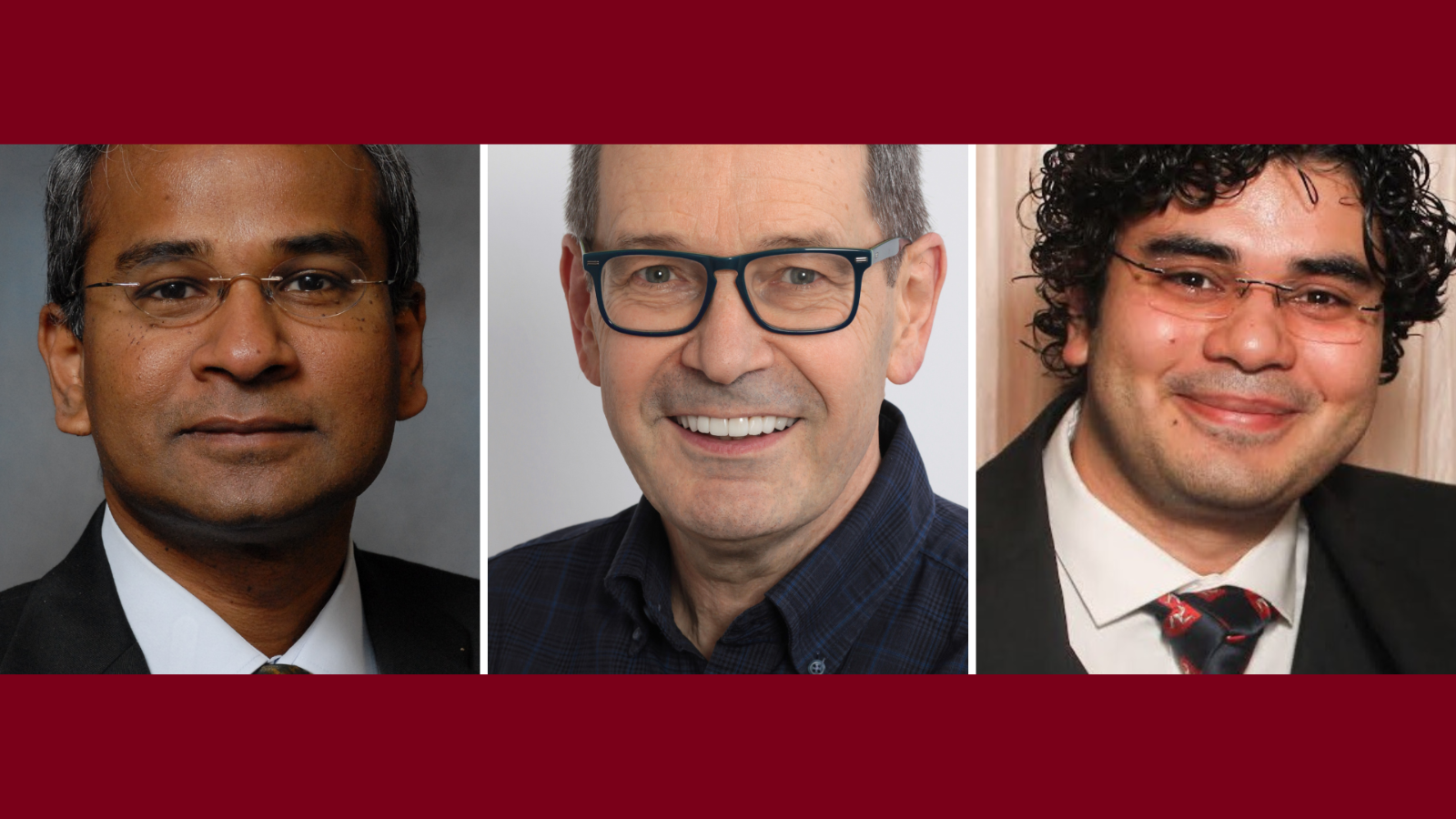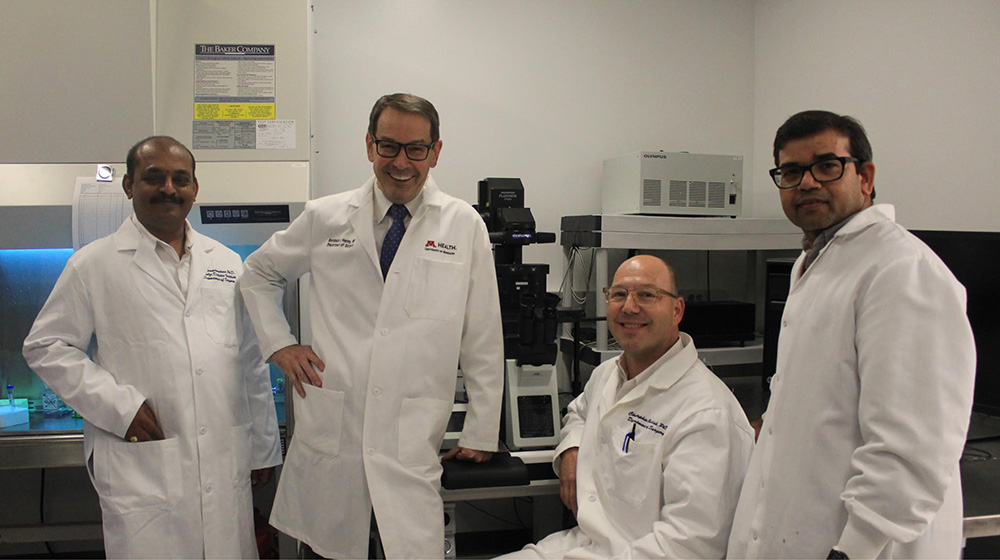Schulze Diabetes Institute
Pioneering superior transplant therapeutics for people burdened with diabetes.
Researchers in the University of Minnesota’s Schulze Diabetes Institute are driven to reverse Type 1 Diabetes. Through pioneering islet transplantation treatments and ongoing research efforts, our goal is to enable people to live diabetes-free lives.

The Department of Surgery Extends its Leadership in Pancreas and Islet Transplantation
The Department of Surgery was well-represented at The International Pancreas and Islet Transplant Association (IPITA) Joint Congress in San Diego, CA, from October 26 to 29, 2023.

University of Minnesota Achieves Transplant in Monkeys Without Long-term Immune-fighting Drug
UMN researchers with the Department of Surgery and Schulze Diabetes Institute have maintained long-term survival and function of pancreatic islet transplants despite complete discontinuation of all anti-rejection drugs on day 21 after the transplant.
Latest News
Promotions!
- Mr. David Heller, BSc., has been promoted from Manager of Islet Manufacturing and R&D to Director of Cell Therapy Manufacturing and R&D.
- The following staff was promoted to Health Care Professional – Clinical Laboratory Scientist: Ms. Dana Le, Ms. Anna Hance, Ms. Siri Larsen, and Mr. Muhamad Abdulla.
- Dr. Amar Singh, PhD promoted to Assistant Professor of Surgery.
- Dr. Sabarinathan Ramachandran, PhD, promoted to Associate Professor of Surgery.
- Ms. Kelly Swenson was promoted to Grants Administrator.
Congratulations!
Bernhard J. Hering, MD been selected for membership in the University of Minnesota’s Academy for Excellence in Health Research and in Team Science.
This Academy is intended to serve as the highest recognition of excellence in faculty research. Those selected have enhanced the reputation of the University of Minnesota through nationally and internationally recognized, sustained, quality health-related research in their fields.
Melena Bellin, MD, Sarah Jane Schwarzenberg, MD, and Srinath Chinnakotla, MBBS, MCh, were the collaborating members on the Team Science Award.
Congratulations!
The Schulze Diabetes Institute is thrilled to announce the promotion of two of our faculty members:
Dr. Sabarinathan Ramachandran, PhD has been promoted to Associate Professor of Surgery.
Dr. Hering has given the following presentations:
June 10, 2021 "Updates in Islet Transplantation: Best Immunosuppressive Protocol", ESOT 2021 MILAN, European Society for Organ Transplantation.
May 13, 2021 "Tolerance of islet allo- and xenografts: A new era in beta cell replacement", Online Diabetes Congress 2021, German Diabetes Society.
May 12, 2021. Hering, B. J., Adams, A. B., McGregor, C. "Solving the Organ Shortage", Solving the Organ Shortage, University of Minnesota, Minneapolis, Minnesota.
March 1, 2021 "Islet transplant activity - CITR Data", Online IPITA-Sponsored Pancreas and Islet Cell Transplant Curriculum, International Pancreas and Islet Transplantation Association.
October 28, 2020 “History of Allo-Islet Transplantation at the University of Minnesota”, Transplant Conference, University of Minnesota.
June 16, 2020 "Cross-Network Conundrum 'A': Recurrent Autoimmune Disease after Transplant in Long-Standing Type 1 Diabetes", Cross Type 1 Diabetes Network Leaders Meeting, National Institute of Diabetes and Digestive and Kidney Diseases. (June 16, 2020).
June 8, 2020 “Cures 2: Exogenous Approach Cell (Beta) Replacement Therapy for T1D" ENDO Online 2020, Endocrine Society.
Drs. Hering, Singh, and Ramachandran all attended the FOCIS (Federation of Clinical Immunology Societies) 2020 Virtual Annual Meeting, Oct 28-31, 2020
Recent Publications
-
Graham, M. L., Ramachandran, S., Singh, A., Moore, M. E. G, Flanagan, B. E., Azimzadeh, A., Burlak, C., Mueller, K. R., Martins, K., Anazawa, T., Balamurugan, A. N., Bansal-Pakala, P., Murtaugh, M. P., O'Brien, T., Papas, K. K., Spizzo, T., Schuurman, H. J., Hancock, W. W., & Hering, B. J. (2021). Clinically available immunosuppression averts rejection but not systemic inflammation after porcine islet xenotransplant in cynomolgus macaques. American Journal of Transplantation 2021 Oct 27; doi: 10.1111/ajt.16876.
-
Rao, J. S., Hosny, N., Kumbha, R., Naqvi, R. A., Singh, A., Swanson, Z., Levy, H., Matson, A. W., Steinhoff, M., Forneris, N., Walters, E., Hering, B. J., & Burlak, C. (2021). HLA-G1+ Expression in GGTA1KO Pigs Suppresses Human and Monkey Anti-Pig T, B and NK Cell Responses. Frontiers in Immunology, 12, 730545. PMID: 34566993 PMCID: PMC8459615 doi: 10.3389/fimmu.2021.730545
-
Nanno, Y., Sterner, E., Gildersleeve, J. C., Hering, B. J., & Burlak, C. (2021). Carbohydrate antigen microarray analysis of serum IgG and IgM antibodies before and after adult porcine islet xenotransplantation in cynomolgus macaques. PloS One, 16(6), e0253029. PMID: 34138941 doi: 10.1371/journal.pone.0253029
-
Nanno, Y., Wastvedt, S., Freeman, M. L., Trikudanathan, G., Schwarzenberg, S. J., Downs, E. M., Kirchner, V., Pruett, T. L., Beilman, G. J., Chinnakotla, S., Hering, B. J., & Bellin, M. D. (2021). Metabolic measures before surgery and long-term diabetes outcomes in recipients of total pancreatectomy and islet autotransplantation. American Journal of Transplantation. PMID: 33754431 doi: 10.1111/ajt.16573
-
Boucher, A. A., Wastvedt, S., Hodges, J. S., Beilman, G. J., Kirchner, V. A., Pruett, T. L., Hering, B. J., Schwarzenberg, S. J., Downs, E., Freeman, M., Trikudanathan, G., Chinnakotla, S., & Bellin, M. D. (2021). Portal Vein Thrombosis may Be More Strongly Associated With Islet Infusion Than Extreme Thrombocytosis After Total Pancreatectomy With Islet Autotransplantation. Transplantation. PMID: 33988346 doi: 10.1097/TP.0000000000003624
Get Involved
The Schulze Diabetes Institute relies upon the support of many—from large foundations to individuals with a vested interest in finding a cure. The best way to support our work is to get involved!
Give
The University of Minnesota Foundation (UMF) works to advance research, education, care, and outreach at the University of Minnesota through private gifts. Please consider making a donation to these funds:
- Jeffrey Dobbs - David E. R. Sutherland, M.D., Ph.D., Diabetes Research Chair
- Islet Research and Transplantation Fund of the Schulze Diabetes Institute
- Islet Transplant Immunology Research Fund
Participate
Meet like-minded people and have fun while raising money and awareness for diabetes research.
November 2021: Thank you to the MN Lions Diabetes Foundation for supporting the following research projects: “Production of genetically engineered pigs as donors of organs for the treatment of diabetes and its complications” and “Bringing immune tolerance to the clinic for people with diabetes and kidney failure.”
Juvenile Diabetes Research Fund (JDRF) Walk to Cure Diabetes
Taking place each year at the Mall of America, the JDRF walk is one of the largest fundraiser walks in the Twin Cities area. The Schulze Diabetes Institute is a major recipient of JDRF grants.
Give to the Max Day
The University of Minnesota Foundation participates in an annual Minnesota event called Give to the Max Day—a day each November set aside for Minnesotans to support causes close to their hearts. Designate your gift on this day to help further a cure for diabetes.
Islets Offer New Life
The SDI is one of only nine places in the world where patients can get life-changing transplants that treat Type 1 Diabetes. Our expertise is second-to-none in this area. In fact, we’ve done more islet transplants than anywhere else. Is this treatment right for you?
If you have Type 1 Diabetes and would like to be considered for future islet transplant clinical trials, you can submit your information here.
Diabetes
Diabetes is a chronic (lifelong) disease marked by high levels of sugar in the blood. Either the body does not produce enough insulin, or cells do not respond to the insulin produced.
Pancreatitis
Pancreatitis is an inflammation of the pancreas. This occurs when enzymes are activated within the organ and they start to digest the pancreas itself.
Contact
Schulze Diabetes Institute
University of Minnesota
420 Delaware Street SE, MMC 195
Minneapolis MN 55455
E. Brian Flanagan, PhD
Scientific Program Director
Office: 612-625-6743
Email: flana051@umn.edu
Kelly Swenson
Grants & Contracts Professional
Office: 612-626-5697
Email: malon187@umn.edu